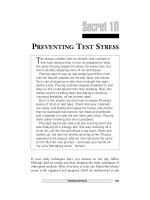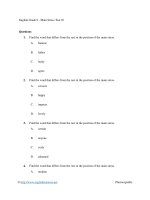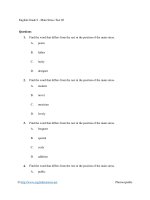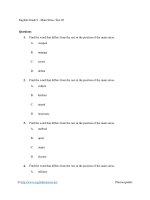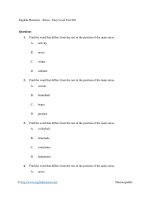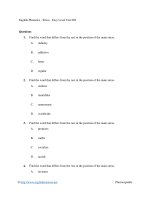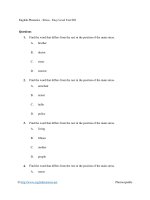PREVENTING TEST STRESS
Bạn đang xem bản rút gọn của tài liệu. Xem và tải ngay bản đầy đủ của tài liệu tại đây (81.13 KB, 10 trang )
If your study techniques leave you anxious on test day, follow
Phuong’s lead by testing and then adopting the study techniques of
other good students. Most of us have at least one friend who always
seems to be organized and prepared. Don’t be embarrassed to ask
Preventing Test Stress
133
Secret 10
P
REVENTING
T
EST
S
TRESS
T
an always creates rules for himself, and nowhere is
this more obvious than in how he prepares for tests.
His sister Phuong teases him about his many rules, but
she is secretly adopting some of his techniques.
Phuong used to stay up late studying and then cram
until her teacher passed out the test. Now, she follows
Tan’s rule of studying no later than midnight the night
before a test. Phuong routinely skipped breakfast on test
days so she could spend more time studying. Now, she
makes a point of sitting down and eating a nutritious,
unrushed breakfast, as her brother does.
But it is this simple rule that most increases Phuong’s
peace of mind on test days: Check that your materials
are ready. Just before she leaves the house, she checks
that her backpack has pencils, her notes and textbook,
and a sweater (in case the test room gets chilly). Phuong
feels calmer knowing that she is prepared.
Phuong’s secret was safe until one evening when she
was studying for a biology test. She was checking off a
to-do list, just like Tan did before a big exam. When she
looked up, she saw her brother grinning at her. Phuong
expected to be teased; after all, she had done the same
to him. But Tan only grinned. “Just keep your hands off
my lucky test-taking socks,” he said.
such friends for study tips and advice. He or she will probably be flat-
tered and more than willing to help. The proper study and test prepa-
ration routine is essential to preventing test stress and anxiety. In this
chapter, you will learn how to recognize the symptoms of test stress as
well as how to effectively relieve them.
SYMPTOMS OF TEST STRESS
Although you may know the materials, and even though you have read
all hints and tips in this book, one factor may still interfere with your
ability to successfully function on test day: test stress.
The best way to alleviate test stress is to first recognize your
symptoms and gain an understanding that the possible reason for
subpar test performance is not lack of intelligence or knowledge,
but is directly related to the stress you feel before and during
the test.
You may recognize test stress by the jittery feeling you get in the pit
of your stomach. Although it may sound like a cliché, your palms may
begin to sweat or your mouth may suddenly become dry. The worse
symptom of all could be the sudden blank you draw when trying to
answer questions that you were able to answer almost automatically
when studying with your study buddy. Many times after leaving a test
and relaxing a bit, you remember the answers to the question or ques-
tions that stumped you the most.
Some symptoms of stress include:
•
an increased heart rate
•
rapid breathing
•
stammering
•
headaches and stomachaches
•
chest pains
•
diarrhea
•
sweating
•
sleeplessness
•
alcohol and drug abuse
Do any of these symptoms sound familiar? If you experience these
symptoms on test day, then you may be suffering from test stress.
134
10 SECRETS TO ACING ANY HIGH SCHOOL TEST
Are You Stressed?
Now that you have had test stress explained to you, and the symp-
toms have been pointed out, you can make a determination about the
level of test stress you may be experiencing. It is common for all test
takers to feel a little nervous on test day, but suffering from test stress
is a more severe form of the normal jitters. If you are feeling test
stress, you will find that you have already taken one of the first steps
to alleviating that stress simply by reading this book and practicing
some of the tips found within. You can also unburden yourself of
some of this stress by ensuring that you are healthy both mentally
and physically.
MINDBENDER
Test-Stress Test
You only need to worry about test anxiety if it is extreme enough to
impair your performance. The following questionnaire will provide
a diagnosis of your level of test anxiety. In the blank before each
statement, write the number that most accurately describes your
experience.
0 ϭ Never 1 ϭ Once or twice 2 ϭ Sometimes 3 ϭ Often
I have gotten so nervous before an exam that I put down
the books and didn’t study for it.
I have experienced disabling physical symptoms such as
vomiting and severe headaches because I was nervous about an
exam.
I have not shown up for an exam because I was scared to
take it.
I have experienced dizziness and disorientation while tak-
ing an exam.
I have had trouble filling in the little circles because my
hands were shaking too hard.
I have failed an exam because I was too nervous to
finish it.
Total: Add up the numbers in the blanks above.
Preventing Test Stress
135
Your Test-Stress Score
Here are the steps you should take, depending on your score. If you
scored:
• Less than 3, your level of test anxiety is nothing to worry about;
it’s probably just enough to give you that little extra edge.
• Between 3 and 6, your test anxiety may be enough to impair
your performance, and you should practice the stress manage-
ment techniques listed in this section to try to bring your test
anxiety down to manageable levels.
• More than 6, your level of test anxiety is a serious concern. In
addition to practicing the stress management techniques listed in
this section, you may want to seek additional personal help. Call
your local high school or community college and ask for the aca-
demic counselor. Tell the counselor that you have a level of test
anxiety that sometimes keeps you from being able to take the
exam. The counselor may be willing to help you or may suggest
someone else you should talk to.
HEALTHY IN MIND
Being mentally healthy, in this case, does not refer to your growing
intellect, but more about your emotional health. Surrounding your-
self with positive influences will undoubtedly create a mentally
healthy you and that will lead to a healthier and more positive outlook
on your everyday life, including that dreaded chemistry exam! Some
of the factors that directly affect your mental health include the
following.
Your Peer Group
It may be a difficult fact to admit to yourself, but your peer group may
be holding you back from performing your best academically. Think
of your core group of friends and classmates. Do they share your
yearning to do their best in school? Are they supportive of your
efforts to study and do well on tests? Unfortunately, some high school
students become disengaged from the whole learning experience and
actually belittle those around them who strive to do well. On the
other hand, surrounding yourself with positive peer influences will
136
10 SECRETS TO ACING ANY HIGH SCHOOL TEST
provide you with the support necessary to make you feel good about
your study efforts.
Personal Environment
Unfortunately, this is something that you may have little control over.
It has been found that students who are going through major life sit-
uations are more likely to experience stress in their everyday lives.
Some of these major life events include:
•
the death of a loved one
•
divorce
•
moving to a new town
•
major health issues in the family
•
living in a dysfunctional family
It is unfortunate that many high school students must live through
these problems, and they do indeed take a toll on their mental health.
If you are now experiencing or recently have experienced one of these
events, take an honest look at how it is affecting you. If necessary, seek
the guidance of a counselor, friend, or role model to help you cope
with the many unique issues surrounding your situation.
STUDY AEROBICS
Creating your own anti-anxiety routine: Pay careful attention to
your anxiety level throughout the school week and on the week-
ends. What activities tend to relax you? If, for example, you find
that playing basketball or practicing yoga helps you de-stress, be
sure to schedule a practice session the morning or night before a
major test. By the same token, take note of the activities that tend
to make you anxious, and avoid them when you have an impending
exam.
What to Do
If you recognize that your mental well-being is not as healthy as it
could be, be encouraged to seek the help of a counselor, family physi-
cian, friend, or role model.
Preventing Test Stress
137


